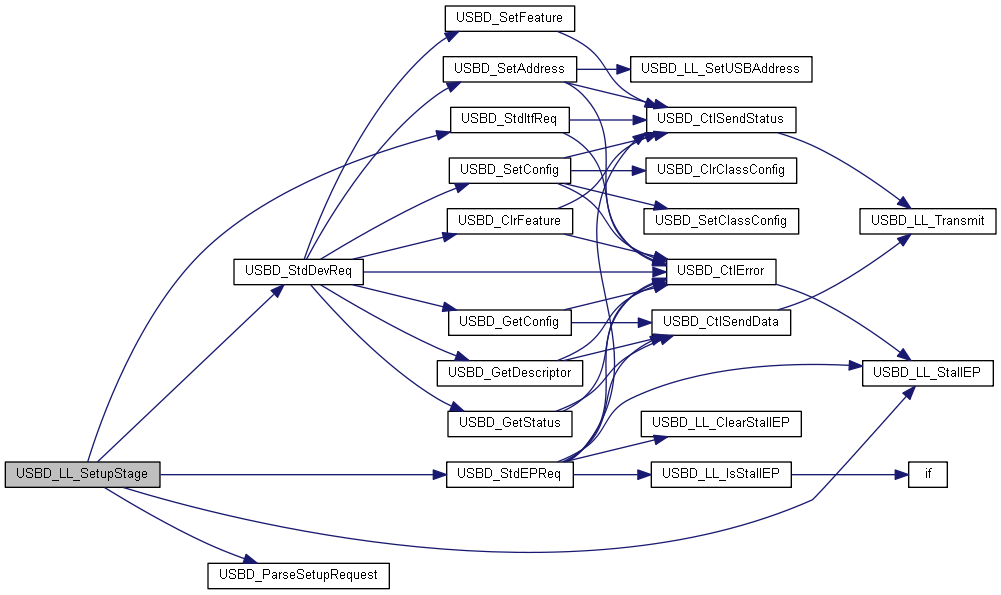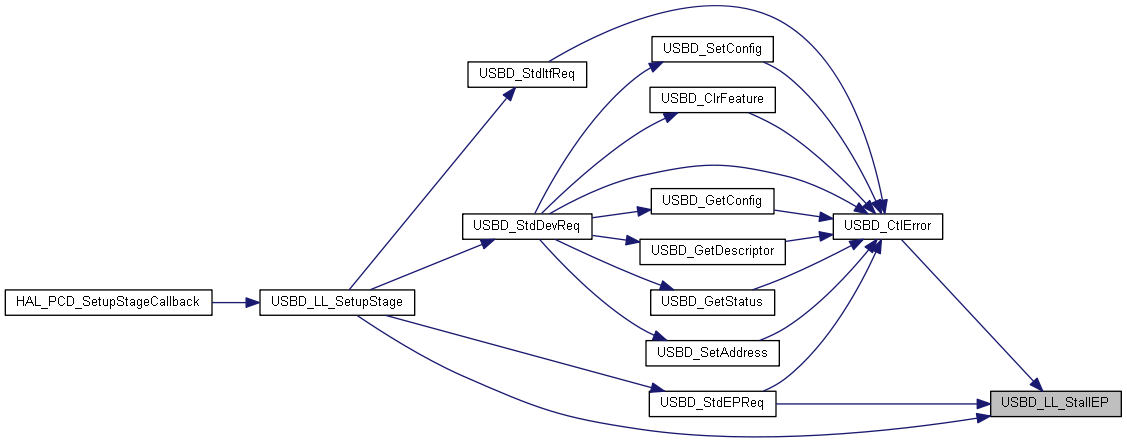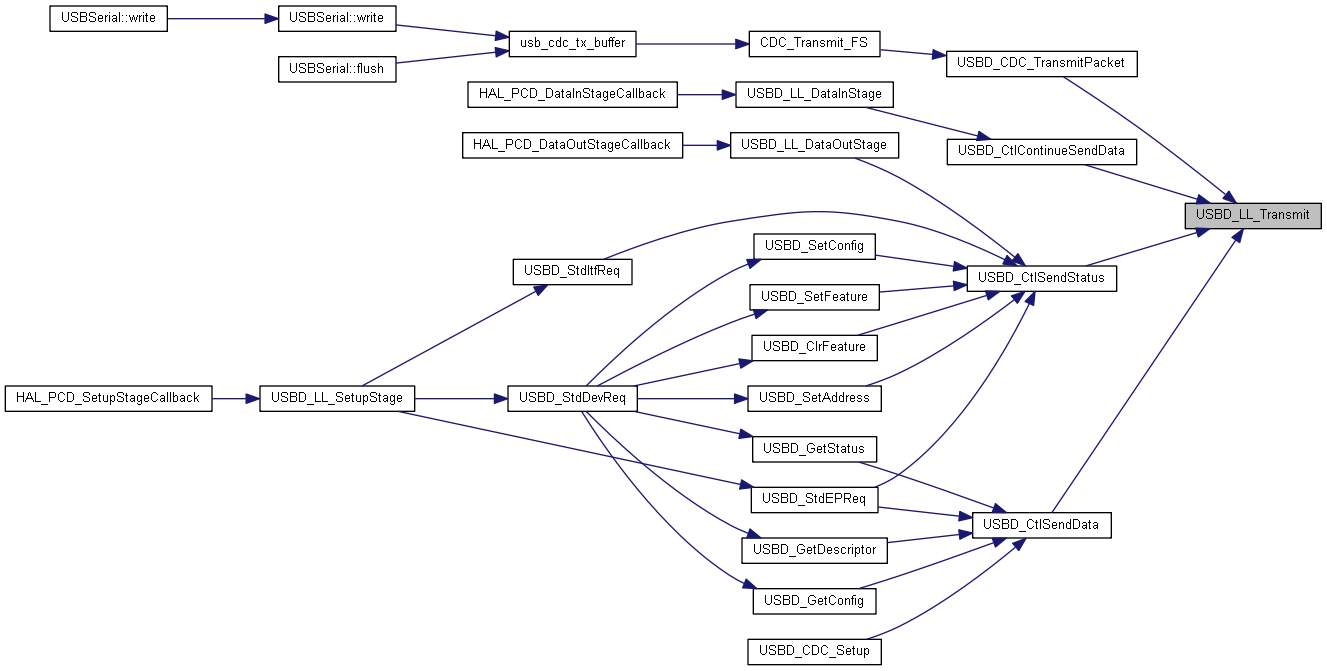|
Prusa MINI Firmware overview
|
|
| USBD_StatusTypeDef | USBD_Init (USBD_HandleTypeDef *pdev, USBD_DescriptorsTypeDef *pdesc, uint8_t id) |
| | USBD_Init Initializes the device stack and load the class driver. More...
|
| |
| USBD_StatusTypeDef | USBD_DeInit (USBD_HandleTypeDef *pdev) |
| | USBD_DeInit Re-Initialize th device library. More...
|
| |
| USBD_StatusTypeDef | USBD_Start (USBD_HandleTypeDef *pdev) |
| | USBD_Start Start the USB Device Core. More...
|
| |
| USBD_StatusTypeDef | USBD_Stop (USBD_HandleTypeDef *pdev) |
| | USBD_Stop Stop the USB Device Core. More...
|
| |
| USBD_StatusTypeDef | USBD_RegisterClass (USBD_HandleTypeDef *pdev, USBD_ClassTypeDef *pclass) |
| | USBD_RegisterClass Link class driver to Device Core. More...
|
| |
| USBD_StatusTypeDef | USBD_RunTestMode (USBD_HandleTypeDef *pdev) |
| | USBD_RunTestMode Launch test mode process. More...
|
| |
| USBD_StatusTypeDef | USBD_SetClassConfig (USBD_HandleTypeDef *pdev, uint8_t cfgidx) |
| | USBD_SetClassConfig Configure device and start the interface. More...
|
| |
| USBD_StatusTypeDef | USBD_ClrClassConfig (USBD_HandleTypeDef *pdev, uint8_t cfgidx) |
| | USBD_ClrClassConfig Clear current configuration. More...
|
| |
| USBD_StatusTypeDef | USBD_LL_SetupStage (USBD_HandleTypeDef *pdev, uint8_t *psetup) |
| | USBD_SetupStage Handle the setup stage. More...
|
| |
| USBD_StatusTypeDef | USBD_LL_DataOutStage (USBD_HandleTypeDef *pdev, uint8_t epnum, uint8_t *pdata) |
| | USBD_DataOutStage Handle data OUT stage. More...
|
| |
| USBD_StatusTypeDef | USBD_LL_DataInStage (USBD_HandleTypeDef *pdev, uint8_t epnum, uint8_t *pdata) |
| | USBD_DataInStage Handle data in stage. More...
|
| |
| USBD_StatusTypeDef | USBD_LL_Reset (USBD_HandleTypeDef *pdev) |
| | USBD_LL_Reset Handle Reset event. More...
|
| |
| USBD_StatusTypeDef | USBD_LL_SetSpeed (USBD_HandleTypeDef *pdev, USBD_SpeedTypeDef speed) |
| | USBD_LL_Reset Handle Reset event. More...
|
| |
| USBD_StatusTypeDef | USBD_LL_Suspend (USBD_HandleTypeDef *pdev) |
| | USBD_Suspend Handle Suspend event. More...
|
| |
| USBD_StatusTypeDef | USBD_LL_Resume (USBD_HandleTypeDef *pdev) |
| | USBD_Resume Handle Resume event. More...
|
| |
| USBD_StatusTypeDef | USBD_LL_SOF (USBD_HandleTypeDef *pdev) |
| | USBD_SOF Handle SOF event. More...
|
| |
| USBD_StatusTypeDef | USBD_LL_IsoINIncomplete (USBD_HandleTypeDef *pdev, uint8_t epnum) |
| | USBD_IsoINIncomplete Handle iso in incomplete event. More...
|
| |
| USBD_StatusTypeDef | USBD_LL_IsoOUTIncomplete (USBD_HandleTypeDef *pdev, uint8_t epnum) |
| | USBD_IsoOUTIncomplete Handle iso out incomplete event. More...
|
| |
| USBD_StatusTypeDef | USBD_LL_DevConnected (USBD_HandleTypeDef *pdev) |
| | USBD_DevConnected Handle device connection event. More...
|
| |
| USBD_StatusTypeDef | USBD_LL_DevDisconnected (USBD_HandleTypeDef *pdev) |
| | USBD_DevDisconnected Handle device disconnection event. More...
|
| |
| USBD_StatusTypeDef | USBD_LL_Init (USBD_HandleTypeDef *pdev) |
| | Initializes the low level portion of the device driver. More...
|
| |
| USBD_StatusTypeDef | USBD_LL_DeInit (USBD_HandleTypeDef *pdev) |
| | De-Initializes the low level portion of the device driver. More...
|
| |
| USBD_StatusTypeDef | USBD_LL_Start (USBD_HandleTypeDef *pdev) |
| | Starts the low level portion of the device driver. More...
|
| |
| USBD_StatusTypeDef | USBD_LL_Stop (USBD_HandleTypeDef *pdev) |
| | Stops the low level portion of the device driver. More...
|
| |
| USBD_StatusTypeDef | USBD_LL_OpenEP (USBD_HandleTypeDef *pdev, uint8_t ep_addr, uint8_t ep_type, uint16_t ep_mps) |
| | Opens an endpoint of the low level driver. More...
|
| |
| USBD_StatusTypeDef | USBD_LL_CloseEP (USBD_HandleTypeDef *pdev, uint8_t ep_addr) |
| | Closes an endpoint of the low level driver. More...
|
| |
| USBD_StatusTypeDef | USBD_LL_FlushEP (USBD_HandleTypeDef *pdev, uint8_t ep_addr) |
| | Flushes an endpoint of the Low Level Driver. More...
|
| |
| USBD_StatusTypeDef | USBD_LL_StallEP (USBD_HandleTypeDef *pdev, uint8_t ep_addr) |
| | Sets a Stall condition on an endpoint of the Low Level Driver. More...
|
| |
| USBD_StatusTypeDef | USBD_LL_ClearStallEP (USBD_HandleTypeDef *pdev, uint8_t ep_addr) |
| | Clears a Stall condition on an endpoint of the Low Level Driver. More...
|
| |
| uint8_t | USBD_LL_IsStallEP (USBD_HandleTypeDef *pdev, uint8_t ep_addr) |
| | Returns Stall condition. More...
|
| |
| USBD_StatusTypeDef | USBD_LL_SetUSBAddress (USBD_HandleTypeDef *pdev, uint8_t dev_addr) |
| | Assigns a USB address to the device. More...
|
| |
| USBD_StatusTypeDef | USBD_LL_Transmit (USBD_HandleTypeDef *pdev, uint8_t ep_addr, uint8_t *pbuf, uint16_t size) |
| | Transmits data over an endpoint. More...
|
| |
| USBD_StatusTypeDef | USBD_LL_PrepareReceive (USBD_HandleTypeDef *pdev, uint8_t ep_addr, uint8_t *pbuf, uint16_t size) |
| | Prepares an endpoint for reception. More...
|
| |
| uint32_t | USBD_LL_GetRxDataSize (USBD_HandleTypeDef *pdev, uint8_t ep_addr) |
| | Returns the last transfered packet size. More...
|
| |
| void | USBD_LL_Delay (uint32_t Delay) |
| | Delays routine for the USB Device Library. More...
|
| |
◆ USBD_Init()
USBD_Init Initializes the device stack and load the class driver.
- Parameters
-
| pdev | device instance |
| pdesc | Descriptor structure address |
| id | Low level core index |
- Return values
-
◆ USBD_DeInit()
USBD_DeInit Re-Initialize th device library.
- Parameters
-
- Return values
-
◆ USBD_Start()
USBD_Start Start the USB Device Core.
- Parameters
-
- Return values
-
◆ USBD_Stop()
USBD_Stop Stop the USB Device Core.
- Parameters
-
- Return values
-
◆ USBD_RegisterClass()
USBD_RegisterClass Link class driver to Device Core.
- Parameters
-
| pDevice | : Device Handle |
| pclass | Class handle |
- Return values
-
◆ USBD_RunTestMode()
USBD_RunTestMode Launch test mode process.
- Parameters
-
- Return values
-
◆ USBD_SetClassConfig()
USBD_SetClassConfig Configure device and start the interface.
- Parameters
-
| pdev | device instance |
| cfgidx | configuration index |
- Return values
-
◆ USBD_ClrClassConfig()
USBD_ClrClassConfig Clear current configuration.
- Parameters
-
| pdev | device instance |
| cfgidx | configuration index |
- Return values
-
◆ USBD_LL_SetupStage()
USBD_SetupStage Handle the setup stage.
- Parameters
-
- Return values
-
◆ USBD_LL_DataOutStage()
USBD_DataOutStage Handle data OUT stage.
- Parameters
-
| pdev | device instance |
| epnum | endpoint index |
- Return values
-
◆ USBD_LL_DataInStage()
USBD_DataInStage Handle data in stage.
- Parameters
-
| pdev | device instance |
| epnum | endpoint index |
- Return values
-
349 pep = &pdev->
ep_in[0];
◆ USBD_LL_Reset()
USBD_LL_Reset Handle Reset event.
- Parameters
-
- Return values
-
◆ USBD_LL_SetSpeed()
USBD_LL_Reset Handle Reset event.
- Parameters
-
- Return values
-
◆ USBD_LL_Suspend()
USBD_Suspend Handle Suspend event.
- Parameters
-
- Return values
-
◆ USBD_LL_Resume()
USBD_Resume Handle Resume event.
- Parameters
-
- Return values
-
◆ USBD_LL_SOF()
USBD_SOF Handle SOF event.
- Parameters
-
- Return values
-
◆ USBD_LL_IsoINIncomplete()
USBD_IsoINIncomplete Handle iso in incomplete event.
- Parameters
-
- Return values
-
◆ USBD_LL_IsoOUTIncomplete()
USBD_IsoOUTIncomplete Handle iso out incomplete event.
- Parameters
-
- Return values
-
◆ USBD_LL_DevConnected()
USBD_DevConnected Handle device connection event.
- Parameters
-
- Return values
-
◆ USBD_LL_DevDisconnected()
USBD_DevDisconnected Handle device disconnection event.
- Parameters
-
- Return values
-
◆ USBD_LL_Init()
Initializes the low level portion of the device driver.
- Parameters
-
- Return values
-
◆ USBD_LL_DeInit()
De-Initializes the low level portion of the device driver.
- Parameters
-
- Return values
-
330 hal_status = HAL_PCD_DeInit(pdev->
pData);
332 switch (hal_status) {
◆ USBD_LL_Start()
Starts the low level portion of the device driver.
- Parameters
-
- Return values
-
361 hal_status = HAL_PCD_Start(pdev->
pData);
363 switch (hal_status) {
◆ USBD_LL_Stop()
Stops the low level portion of the device driver.
- Parameters
-
- Return values
-
392 hal_status = HAL_PCD_Stop(pdev->
pData);
394 switch (hal_status) {
◆ USBD_LL_OpenEP()
Opens an endpoint of the low level driver.
- Parameters
-
| pdev | Device handle |
| ep_addr | Endpoint number |
| ep_type | Endpoint type |
| ep_mps | Endpoint max packet size |
- Return values
-
426 hal_status = HAL_PCD_EP_Open(pdev->
pData, ep_addr, ep_mps, ep_type);
428 switch (hal_status) {
◆ USBD_LL_CloseEP()
Closes an endpoint of the low level driver.
- Parameters
-
| pdev | Device handle |
| ep_addr | Endpoint number |
- Return values
-
458 hal_status = HAL_PCD_EP_Close(pdev->
pData, ep_addr);
460 switch (hal_status) {
◆ USBD_LL_FlushEP()
Flushes an endpoint of the Low Level Driver.
- Parameters
-
| pdev | Device handle |
| ep_addr | Endpoint number |
- Return values
-
490 hal_status = HAL_PCD_EP_Flush(pdev->
pData, ep_addr);
492 switch (hal_status) {
◆ USBD_LL_StallEP()
Sets a Stall condition on an endpoint of the Low Level Driver.
- Parameters
-
| pdev | Device handle |
| ep_addr | Endpoint number |
- Return values
-
522 hal_status = HAL_PCD_EP_SetStall(pdev->
pData, ep_addr);
524 switch (hal_status) {
◆ USBD_LL_ClearStallEP()
Clears a Stall condition on an endpoint of the Low Level Driver.
- Parameters
-
| pdev | Device handle |
| ep_addr | Endpoint number |
- Return values
-
554 hal_status = HAL_PCD_EP_ClrStall(pdev->
pData, ep_addr);
556 switch (hal_status) {
◆ USBD_LL_IsStallEP()
Returns Stall condition.
- Parameters
-
| pdev | Device handle |
| ep_addr | Endpoint number |
- Return values
-
583 PCD_HandleTypeDef *hpcd = (PCD_HandleTypeDef *)pdev->
pData;
585 if ((ep_addr & 0x80) == 0x80) {
586 return hpcd->IN_ep[ep_addr & 0x7F].is_stall;
588 return hpcd->OUT_ep[ep_addr & 0x7F].is_stall;
◆ USBD_LL_SetUSBAddress()
Assigns a USB address to the device.
- Parameters
-
| pdev | Device handle |
| dev_addr | Device address |
- Return values
-
602 hal_status = HAL_PCD_SetAddress(pdev->
pData, dev_addr);
604 switch (hal_status) {
◆ USBD_LL_Transmit()
Transmits data over an endpoint.
- Parameters
-
| pdev | Device handle |
| ep_addr | Endpoint number |
| pbuf | Pointer to data to be sent |
| size | Data size |
- Return values
-
636 hal_status = HAL_PCD_EP_Transmit(pdev->
pData, ep_addr,
pbuf,
size);
638 switch (hal_status) {
◆ USBD_LL_PrepareReceive()
Prepares an endpoint for reception.
- Parameters
-
| pdev | Device handle |
| ep_addr | Endpoint number |
| pbuf | Pointer to data to be received |
| size | Data size |
- Return values
-
670 hal_status = HAL_PCD_EP_Receive(pdev->
pData, ep_addr,
pbuf,
size);
672 switch (hal_status) {
◆ USBD_LL_GetRxDataSize()
Returns the last transfered packet size.
- Parameters
-
| pdev | Device handle |
| ep_addr | Endpoint number |
- Return values
-
◆ USBD_LL_Delay()
| void USBD_LL_Delay |
( |
uint32_t |
Delay | ) |
|
Delays routine for the USB Device Library.
- Parameters
-
- Return values
-
uint8_t(* DeInit)(struct _USBD_HandleTypeDef *pdev, uint8_t cfgidx)
Definition: usbd_def.h:163
uint8_t dev_old_state
Definition: usbd_def.h:237
#define USBD_ErrLog(...)
Definition: usbd_conf.h:157
uint8_t(* SOF)(struct _USBD_HandleTypeDef *pdev)
Definition: usbd_def.h:171
USBD_StatusTypeDef USBD_RunTestMode(USBD_HandleTypeDef *pdev)
USBD_RunTestMode Launch test mode process.
Definition: usbd_core.c:213
USBD_StatusTypeDef USBD_CtlContinueRx(USBD_HandleTypeDef *pdev, uint8_t *pbuf, uint16_t len)
USBD_CtlContinueRx continue receive data on the ctl pipe.
Definition: usbd_ioreq.c:160
Definition: stm32f4xx_hal_def.h:59
uint16_t wLength
Definition: usbd_def.h:155
Definition: stm32f4xx_hal_def.h:57
USBD_StatusTypeDef USBD_LL_Start(USBD_HandleTypeDef *pdev)
Starts the low level portion of the device driver.
Definition: usbd_conf.c:355
USBD_SetupReqTypedef request
Definition: usbd_def.h:243
#define USBD_STATE_CONFIGURED
Definition: usbd_def.h:120
USBD_ClassTypeDef * pClass
Definition: usbd_def.h:245
#define DEVICE_FS
Definition: usbd_conf.h:111
#define MIN(a, b)
Definition: usbd_def.h:265
PCD_HandleTypeDef hpcd_USB_OTG_FS
Definition: usbd_conf.c:69
Definition: usbd_def.h:197
uint8_t(* DataOut)(struct _USBD_HandleTypeDef *pdev, uint8_t epnum)
Definition: usbd_def.h:170
uint8_t dev_state
Definition: usbd_def.h:236
uint32_t ep0_state
Definition: usbd_def.h:234
USBD_EndpointTypeDef ep_in[15]
Definition: usbd_def.h:232
Definition: stm32f4xx_hal_def.h:60
USBD_DescriptorsTypeDef * pDesc
Definition: usbd_def.h:244
#define USBD_EP0_DATA_OUT
Definition: usbd_def.h:128
uint8_t bmRequest
Definition: usbd_def.h:151
#define USBD_EP0_SETUP
Definition: usbd_def.h:126
uint32_t ep0_data_len
Definition: usbd_def.h:235
void * pClassData
Definition: usbd_def.h:246
#define NULL
Definition: usbd_def.h:53
#define USB_MAX_EP0_SIZE
Definition: usbd_def.h:115
uint32_t dev_config
Definition: usbd_def.h:228
#define USB_REQ_RECIPIENT_DEVICE
Definition: usbd_def.h:78
#define USB_REQ_RECIPIENT_INTERFACE
Definition: usbd_def.h:79
USBD_StatusTypeDef USBD_StdEPReq(USBD_HandleTypeDef *pdev, USBD_SetupReqTypedef *req)
USBD_StdEPReq Handle standard usb endpoint requests.
Definition: usbd_ctlreq.c:207
USBD_StatusTypeDef USBD_LL_OpenEP(USBD_HandleTypeDef *pdev, uint8_t ep_addr, uint8_t ep_type, uint16_t ep_mps)
Opens an endpoint of the low level driver.
Definition: usbd_conf.c:420
Definition: stm32f4xx_hal_def.h:58
HAL_StatusTypeDef
HAL Status structures definition.
Definition: stm32f4xx_hal_def.h:55
USBD_StatusTypeDef USBD_StdDevReq(USBD_HandleTypeDef *pdev, USBD_SetupReqTypedef *req)
USBD_StdDevReq Handle standard usb device requests.
Definition: usbd_ctlreq.c:119
USBD_StatusTypeDef USBD_LL_Init(USBD_HandleTypeDef *pdev)
Initializes the low level portion of the device driver.
Definition: usbd_conf.c:290
void Error_Handler(void)
This function is executed in case of error occurrence.
Definition: main.c:1057
void USBD_ParseSetupRequest(USBD_SetupReqTypedef *req, uint8_t *pdata)
USBD_ParseSetupRequest Copy buffer into setup structure.
Definition: usbd_ctlreq.c:698
USBD_StatusTypeDef USBD_LL_Stop(USBD_HandleTypeDef *pdev)
Stops the low level portion of the device driver.
Definition: usbd_conf.c:386
Definition: usbd_def.h:225
USBD_StatusTypeDef USBD_LL_StallEP(USBD_HandleTypeDef *pdev, uint8_t ep_addr)
Sets a Stall condition on an endpoint of the Low Level Driver.
Definition: usbd_conf.c:516
void * pData
Definition: usbd_def.h:248
Definition: usbd_def.h:216
uint8_t(* EP0_RxReady)(struct _USBD_HandleTypeDef *pdev)
Definition: usbd_def.h:167
uint32_t rem_length
Definition: usbd_def.h:220
uint8_t(* DataIn)(struct _USBD_HandleTypeDef *pdev, uint8_t epnum)
Definition: usbd_def.h:169
if(size<=((png_alloc_size_t) -1) - ob)
Definition: pngwrite.c:2176
uint8_t(* Init)(struct _USBD_HandleTypeDef *pdev, uint8_t cfgidx)
Definition: usbd_def.h:162
USBD_StatusTypeDef USBD_CtlContinueSendData(USBD_HandleTypeDef *pdev, uint8_t *pbuf, uint16_t len)
USBD_CtlContinueSendData continue sending data on the ctl pipe.
Definition: usbd_ioreq.c:117
Definition: usbd_def.h:196
uint8_t id
Definition: usbd_def.h:227
const uint8_t[]
Definition: 404_html.c:3
USBD_SpeedTypeDef dev_speed
Definition: usbd_def.h:231
USBD_StatusTypeDef USBD_LL_PrepareReceive(USBD_HandleTypeDef *pdev, uint8_t ep_addr, uint8_t *pbuf, uint16_t size)
Prepares an endpoint for reception.
Definition: usbd_conf.c:664
USBD_EndpointTypeDef ep_out[15]
Definition: usbd_def.h:233
USBD_StatusTypeDef USBD_CtlSendStatus(USBD_HandleTypeDef *pdev)
USBD_CtlSendStatus send zero lzngth packet on the ctl pipe.
Definition: usbd_ioreq.c:177
#define USBD_STATE_DEFAULT
Definition: usbd_def.h:118
uint8_t dev_test_mode
Definition: usbd_def.h:240
USBD_StatusTypeDef USBD_CtlReceiveStatus(USBD_HandleTypeDef *pdev)
USBD_CtlReceiveStatus receive zero lzngth packet on the ctl pipe.
Definition: usbd_ioreq.c:195
static status_t status
Definition: filament_sensor.c:37
USBD_StatusTypeDef
Definition: usbd_def.h:194
USBD_StatusTypeDef USBD_StdItfReq(USBD_HandleTypeDef *pdev, USBD_SetupReqTypedef *req)
USBD_StdItfReq Handle standard usb interface requests.
Definition: usbd_ctlreq.c:170
uint8_t USBD_LL_IsStallEP(USBD_HandleTypeDef *pdev, uint8_t ep_addr)
Returns Stall condition.
Definition: usbd_conf.c:580
#define USB_REQ_RECIPIENT_ENDPOINT
Definition: usbd_def.h:80
#define USBD_EP_TYPE_CTRL
Definition: usbd_def.h:133
#define USBD_STATE_SUSPENDED
Definition: usbd_def.h:121
#define USBD_EP0_DATA_IN
Definition: usbd_def.h:127
uint8_t(* EP0_TxSent)(struct _USBD_HandleTypeDef *pdev)
Definition: usbd_def.h:166
Definition: usbd_def.h:195
uint32_t maxpacket
Definition: usbd_def.h:221
static png_bytep size_t size
Definition: pngwrite.c:2170
uint32_t total_length
Definition: usbd_def.h:219
USBD_StatusTypeDef USBD_LL_DeInit(USBD_HandleTypeDef *pdev)
De-Initializes the low level portion of the device driver.
Definition: usbd_conf.c:324






































